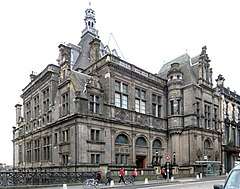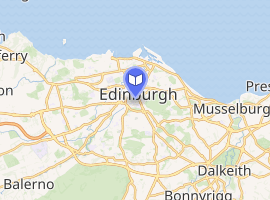Central Library, Edinburgh
Central Library in Edinburgh, Scotland, opened in 1890, was the first public library building in the city. Edinburgh Central library comprises six libraries: Lending, Reference, Music, Art and Design, Edinburgh and Scottish and the Children's Library.
 | |
| Country | United Kingdom |
|---|---|
| Type | Public library |
| Established | 1890 |
| Location | George IV Bridge Edinburgh EH1 1EG |
| Coordinates | 55°56′54″N 3°11′33″W |
| Website | https://www.edinburgh.gov.uk/centrallibrary |
| Map | |

| |
History
Today there are 28 public libraries in Edinburgh but, as the first to open in the Scottish capital, the creation of Central Library was funded with £50,000 by philanthropist Andrew Carnegie.[1][2][3] At the opening ceremony a telegram from Carnegie was read out stating: "We trust that this Library is to grow in usefullness year after year, and prove one of the most potent agencies for the good of the people for all time to come."[3]
The site selected for the library was the former home of Sir Thomas Hope, 1st Baronet Hope of Craighall, advocate for King Charles I.[4] The structure, built in 1616, was demolished in March 1887 to make way for the library.[4] The lintel from Hope's home, bearing the carved inscription TECUM HABITA 1616 from the fourth satire of Persius, is preserved above an inner doorway of the library.[5][6]
Carnegie's funding was initially an offer of £25,000 in 1886 which was doubled, overcoming prior opposition to the establishment of a public library, the city—last of those to do so in Scotland—adopted the Public Libraries Act and on 9 July 1887, Carnegie laid the foundation stone of architect George Washington Browne's French Renaissance-styled building.[3]
Washington Browne's design was the winning entry in the architectural competition for the new library and was selected from 37 submissions.[7] His grand building stands three levels tall above George IV Bridge and reaches down to the Cowgate below, spanning the disjointed streets of Edinburgh's Old Town.
Above the main door is the motto, "Let there be Light" which Carnegie insisted was placed above the entrance to every library he funded.[8] The facade of Central Library is also decorated with stone carvings depicting the coat of arms of the City of Edinburgh, Coat of Arms of Scotland and the Royal Arms. There are nine small square reliefs relating to printers[9] and a large sculpture of Caledonia by Alexander Handyside Ritchie.
Records for 1890, the first full year the library was open, show that over 440,000 book loans were issued.[3]
Central library has been adapted and expanded many times over the years[10] Only a year after opening the library was already running out of space and a book store was added in 1903. By 1928, the library was short of space again. Proposals were made for a better use of the space and a public lift was installed.
In 1930, the adjacent building at no.3 George IV Bridge was acquired allowing the library to expand again.[8] Further nearby premises were bought in the 1940s and in 1961, a mezzanine level was created above the former Newspaper Room.[10]
In May 2014, the new children's and music libraries were opened within the main library building. These had previously been housed in a separate building on George IV Bridge. The children's library features a wall graphic by award-winning children's book illustrator Catherine Rayner.[11]
In November 2017, on the 100th anniversary of her death, a memorial to Dr Elsie Inglis, the founder of the Scottish Women's Hospitals, was unveiled at Central Library.[12]
Collections
As with all public libraries in Edinburgh, adult collections are organised using the Library of Congress Classification system.[13] Since Wigan dropped the system during a 1974 local government reorganisation, Edinburgh is the only municipality in the UK continuing to use it. Children's books are organised under the more-widespread Dewey Decimal Classification scheme.[14]
Edinburgh Central Library holds in its collections three of the Scottish book sculptures, which are on display in its main foyer. The sculptures were the work of an anonymous artist who left these artworks among a series of other in literary venues during the Edinburgh International Book Festival in 2011. The sculptures in the collection depict a magnifying glass, a teacup and a small figure ‘lost in a book’.[15]
 Lost in a good book..., 2011
Lost in a good book..., 2011 Magnifying glass, 2011
Magnifying glass, 2011 Tea, cake and a book, 2011
Tea, cake and a book, 2011
Filming Location
Edinburgh Central Library was used as a filming location for the TV series Rebus, during episode one Black & Blue. Outside building shots were taken and as well as a scene in the reference section.[16]
Gallery
 Upper Floor Reference Library with original card indices and an abundance of natural lighting
Upper Floor Reference Library with original card indices and an abundance of natural lighting- Andrew Carneige bust
- Andrew Carnegie motto - Let There Be Light
 Domed ceiling
Domed ceiling- Central Library and St Mary Magdalene Chapel viewed from Greyfriars Kirkyard
- John Day's motto on the facade of Edinburgh Central Library.
- Walter Chepman tablet, Edinburgh Central Library
References
- Central Library City of Edinburgh Council
- Edinburgh Public Libraries 1890–1950, p. 2
- Armstrong & White, p. 3
- "Visitors To The Site Of The Free Library". Scotland: Edinburgh Evening News, Midlothian, Scotland. 23 March 1887.
- Rosaline Masson (23 January 2015). "V". Edinburgh (Illustrations). Scotland: Adam and Charles Black. Retrieved 13 July 2017.
- Robert Chambers, John Gibson Lockhart, R. L. Stevenson (27 November 2014). The Edinburgh Collection: Traditions of Edinburgh , Peter's Letters to his Kinfolk, Edinburgh: Picturesque Notes. Palimpsest Book Production Limited.CS1 maint: multiple names: authors list (link)
- "Edinburgh city library blog".
- Guided Tour Central Library. Edinburgh Central Library.
- "A History of Edinburgh Libraries".
- "Capital Collections website".
- "Library Design: the transformation of Edinburgh Central Library's Children and Music Libraries". CILIP. 24 November 2015. Retrieved 12 November 2018.
- Gordon, Rebecca (24 November 2017). "War hero and suffragist Dr Elsie Inglis honoured at Central Library". www.edinburgh.gov.uk. Retrieved 16 January 2018.
- Bowman, J. H. (November 2005). "Classification in British Public Libraries: A Historical perspective". Library History. 21: 161.
- Edinburgh Public Libraries 1890–1950, p.4
- Gordon, Rebecca. "Final mystery book sculpture settles at Edinburgh Central Library". www.edinburgh.gov.uk. Retrieved 22 November 2018.
- "Rebus Film Locations in Edinburgh - This is Edinburgh". edinburgh.org. Retrieved 12 November 2018.
Bibliography
- Armstrong, Norma; Aitken, W.R. (1971). A history of the public library movementin Scotland to 1955. Glasgow: Scottish Library Association.
- Edinburgh Public Libraries 1890–1950: A Handbook and History of Sixty Years Progress. Edinburgh Public Libraries Committee. 1951.
External links
- City of Edinburgh Council page for the library
- Central Library - Facebook page
